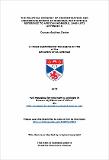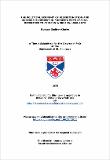Files in this item
The political economy of discrimination and underdevelopment in Rhodesia, with special reference to African workers, 1940-73
Item metadata
| dc.contributor.advisor | Robson, Peter | |
| dc.contributor.author | Clarke, Duncan Godfrey | |
| dc.coverage.spatial | 880 | en_US |
| dc.date.accessioned | 2012-06-20T08:21:51Z | |
| dc.date.available | 2012-06-20T08:21:51Z | |
| dc.date.issued | 1975 | |
| dc.identifier.uri | https://hdl.handle.net/10023/2812 | |
| dc.description.abstract | The study begins by examining the orthodox theory of discrimination as a possible model with which to evaluate the socio-economic basis of race relations in Rhodesia. It is argued that it is inadequate because the theory is not grounded in the settler-colonial system, its historiography and the peripheral capitalist social formation in Rhodesia in which a complex articulation between modes of production is found. A critique is then undertaken of the principal theories hitherto used to explain the course of Rhodesian economic development - namely, dualism and those termed neo-marxist. It is argued that Barber's modification of the dualistic model of W. A. Lewis is deficient particularly because of the absence of a theory of 'primitive accumulation' and also the lack of an analysis of the political economy of the 'labour transfer', the basis of peripheral capitalist development. Arrighi's 'neo-maraist' analysis of Rhodesian development is also criticized for its inadequate theory of 'primitive accumulation' and the lack of attention paid to the labour mobilization process. An analytical alternative is proposed, based on an explanation of 'primitive capital accumulation' and the specific forms of-labour utilization found in Rhodesia in association with particular modes of production existent during the period under review. An attempt is made to specify these modes and the social relations related thereto. The labour structures found in the economic system are then examined in the context of the income distribution pattern, the class structure of the social formation and the primary 'dynamic' of Rhodesian postwar development - industrialization. It is suggested that changes in labour policy in various modes of production were essentially concerned with ensuring the maintenance of a system of cheap labour whereby employers acquired labour-power below the cost of its own reproduction. The development of peripheral capitalism under conditions of settler colonialism required changes to labour policy. These modifications left the basic structures of the socio-economic system intact, although they gave rise to substantial pressures for change, e. g. from unions and African nationalism. The State has been particularly significant in containing these socio-economic and political pressures, especially in the field of labour policy. An attempt is made to identify the changes in labour mobilization that have taken place, to assess their impact on the nature of discrimination and underdevelopment, and to point out some of the more important features of the class formation process that have resulted from the development of capitalism in Rhodesia. | en_US |
| dc.language.iso | en | en_US |
| dc.publisher | University of St Andrews | |
| dc.rights | Creative Commons Attribution-NonCommercial-NoDerivs 3.0 Unported | |
| dc.rights.uri | http://creativecommons.org/licenses/by-nc-nd/3.0/ | |
| dc.subject.lcc | HC517.R4C6 | |
| dc.subject.lcsh | Islamic countries--Economic conditions | en_US |
| dc.subject.lcsh | Islamic countries--Economic conditions--Case studies | en_US |
| dc.title | The political economy of discrimination and underdevelopment in Rhodesia, with special reference to African workers, 1940-73 | en_US |
| dc.type | Thesis | en_US |
| dc.type.qualificationlevel | Doctoral | en_US |
| dc.type.qualificationname | PhD Doctor of Philosophy | en_US |
| dc.publisher.institution | The University of St Andrews | en_US |
This item appears in the following Collection(s)
Except where otherwise noted within the work, this item's licence for re-use is described as Creative Commons Attribution-NonCommercial-NoDerivs 3.0 Unported
Items in the St Andrews Research Repository are protected by copyright, with all rights reserved, unless otherwise indicated.



